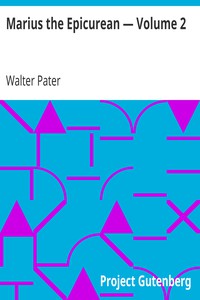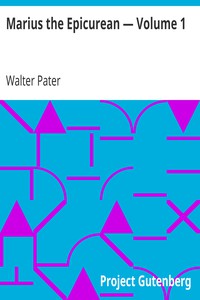Marius the Epicurean — Volume 2, Walter Pater [best romantic novels in english txt] 📗

- Author: Walter Pater
Book online «Marius the Epicurean — Volume 2, Walter Pater [best romantic novels in english txt] 📗». Author Walter Pater
Rome did well to be serious. The discourse ended somewhat abruptly, as the noise of a great crowd in motion was heard below the walls; whereupon, the audience, following the humour of the younger element in it, poured into the colonnade, from the steps of which the famous procession, or transvectio, of the military knights was to be seen passing over the Forum, from their trysting-place at the temple of Mars, to the temple of the Dioscuri. The ceremony took place this year, not on the day accustomed—anniversary of the victory of Lake Regillus, with its pair of celestial assistants—and amid the heat and roses of a Roman July, but, by anticipation, some months earlier, the almond-trees along the way being still in leafless flower. Through that light trellis-work, Marius watched the riders, arrayed in all their gleaming ornaments, and wearing wreaths of olive around their helmets, the faces below which, what with battle and the plague, were almost all youthful. It was a flowery scene enough, but had to-day its fulness of war-like meaning; the return of the army to the North, where the enemy was again upon the move, being now imminent. Cornelius had ridden along in his place, and, on the dismissal of the company, passed below the steps where Marius stood, with that new song he had heard once before floating from his lips.
NOTES
10. +Transliteration: Ho kosmos hôsanei polis estin. Translation: “The world is like a city.”
10. +Transliteration: to prepon ... ta êthê. Translation: “That which is seemly ... mores.”
SECOND THOUGHTS
And Marius, for his part, was grave enough. The discourse of Cornelius Fronto, with its wide prospect over the human, the spiritual, horizon, had set him on a review—on a review of the isolating narrowness, in particular, of his own theoretic scheme. Long after the very latest roses were faded, when “the town” had departed to country villas, or the baths, or the war, he remained behind in Rome; anxious to try the lastingness of his own Epicurean rose-garden; setting to work over again, and deliberately passing from point to point of his old argument with himself, down to its practical conclusions. That age and our own have much in common—many difficulties and hopes. Let the reader pardon me if here and there I seem to be passing from Marius to his modern representatives—from Rome, to Paris or London.
What really were its claims as a theory of practice, of the sympathies that determine practice? It had been a theory, avowedly, of loss and gain (so to call it) of an economy. If, therefore, it missed something in the commerce of life, which some other theory of practice was able to include, if it made a needless sacrifice, then it must be, in a manner, inconsistent with itself, and lack theoretic completeness. Did it make such a sacrifice? What did it lose, or cause one to lose?
And we may note, as Marius could hardly have done, that Cyrenaicism is ever the characteristic philosophy of youth, ardent, but narrow in its survey—sincere, but apt to become one-sided, or even fanatical. It is one of those subjective and partial ideals, based on vivid, because limited, apprehension of the truth of one aspect of experience (in this case, of the beauty of the world and the brevity of man’s life there) which it may be said to be the special vocation of the young to express. In the school of Cyrene, in that comparatively fresh Greek world, we see this philosophy where it is least blasé, as we say; in its most pleasant, its blithest and yet perhaps its wisest form, youthfully bright in the youth of European thought. But it grows young again for a while in almost every youthful soul. It is spoken of sometimes as the appropriate utterance of jaded men; but in them it can hardly be sincere, or, by the nature of the case, an enthusiasm. “Walk in the ways of thine heart, and in the sight of thine eyes,” is, indeed, most often, according to the supposition of the book from which I quote it, the counsel of the young, who feel that the sunshine is pleasant along their veins, and wintry weather, though in a general sense foreseen, a long way off. The youthful enthusiasm or fanaticism, the self-abandonment to one favourite mode of thought or taste, which occurs, quite naturally, at the outset of every really vigorous intellectual career, finds its special opportunity in a theory such as that so carefully put together by Marius, just because it seems to call on one to make the sacrifice, accompanied by a vivid sensation of power and will, of what others value—sacrifice of some conviction, or doctrine, or supposed first principle—for the sake of that clear-eyed intellectual consistency, which is like spotless bodily cleanliness, or scrupulous personal honour, and has itself for the mind of the youthful student, when he first comes to appreciate it, the fascination of an ideal.
The Cyrenaic doctrine, then, realised as a motive of strenuousness or enthusiasm, is not so properly the utterance of the “jaded Epicurean,” as of the strong young man in all the freshness of thought and feeling, fascinated by the notion of raising his life to the level of a daring theory, while, in the first genial heat of existence, the beauty of the physical world strikes potently upon his wide-open, unwearied senses. He discovers a great new poem every spring, with a hundred delightful things he too has felt, but which have never been expressed, or at least never so truly, before. The workshops of the artists, who can select and set before us what is really most distinguished in visible life, are open to him. He thinks that the old Platonic, or the new Baconian philosophy, has been better explained than by the authors themselves, or with some striking original development, this very month. In the quiet heat of early summer, on the dusty gold morning, the music comes, louder at intervals, above the hum of voices from some neighbouring church, among the flowering trees, valued now, perhaps, only for the poetically rapt faces among priests or worshippers, or the mere skill and eloquence, it may be, of its preachers of faith and righteousness. In his scrupulous idealism, indeed, he too feels himself to be something of a priest, and that devotion of his days to the contemplation of what is beautiful, a sort of perpetual religious service. Afar off, how many fair cities and delicate sea-coasts await him! At that age, with minds of a certain constitution, no very choice or exceptional circumstances are needed to provoke an enthusiasm something like this. Life in modern London even, in the heavy glow of summer, is stuff sufficient for the fresh imagination of a youth to build its “palace of art” of; and the very sense and enjoyment of an experience in which all is new, are but enhanced, like that glow of summer itself, by the thought of its brevity, giving him something of a gambler’s zest, in the apprehension, by dexterous act or diligently appreciative thought, of the highly coloured moments which are to pass away so quickly. At bottom, perhaps, in his elaborately developed self-consciousness, his sensibilities, his almost fierce grasp upon the things he values at all, he has, beyond all others, an inward need of something permanent in its character, to hold by: of which circumstance, also, he may be partly aware, and that, as with the brilliant Claudio in Measure for Measure, it is, in truth, but darkness he is, “encountering, like a bride.” But the inevitable falling of the curtain is probably distant; and in the daylight, at least, it is not often that he really shudders at the thought of the grave—the weight above, the narrow world and its company, within. When the thought of it does occur to him, he may say to himself:—Well! and the rude monk, for instance, who has renounced all this, on the security of some dim world beyond it, really acquiesces in that “fifth act,” amid all the consoling ministries around him, as little as I should at this moment; though I may hope, that, as at the real ending of a play, however well acted, I may already have had quite enough of it, and find a true well-being in eternal sleep.
And precisely in this circumstance, that, consistently with the function of youth in general, Cyrenaicism will always be more or less the special philosophy, or “prophecy,” of the young, when the ideal of a rich experience comes to them in the ripeness of the receptive, if not of the reflective, powers—precisely in this circumstance, if we rightly consider it, lies the duly prescribed corrective of that philosophy. For it is by its exclusiveness, and by negation rather than positively, that such theories fail to satisfy us permanently; and what they really need for their correction, is the complementary influence of some greater system, in which they may find their due place. That Sturm und Drang of the spirit, as it has been called, that ardent and special apprehension of half-truths, in the enthusiastic, and as it were “prophetic” advocacy of which, devotion to truth, in the case of the young—apprehending but one point at a time in the great circumference—most usually embodies itself, is levelled down, safely enough, afterwards, as in history so in the individual, by the weakness and mere weariness, as well as by the maturer wisdom, of our nature. And though truth indeed, resides, as has been said, “in the whole”—in harmonisings and adjustments like this—yet those special apprehensions may still owe their full value, in this sense of “the whole,” to that earlier, one-sided but ardent pre-occupation with them.
Cynicism and Cyrenaicism:—they are the earlier Greek forms of Roman Stoicism and Epicureanism, and in that world of old Greek thought, we may notice with some surprise that, in a little while, the nobler form of Cyrenaicism—Cyrenaicism cured of its faults—met the nobler form of Cynicism half-way. Starting from opposed points, they merged, each in its most refined form, in a single ideal of temperance or moderation. Something of the same kind may be noticed regarding some later phases of Cyrenaic theory. If it starts with considerations opposed to the religious temper, which the religious temper holds it a duty to repress, it is like it, nevertheless, and very unlike any lower development of temper, in its stress and earnestness, its serious application to the pursuit of a very unworldly type of perfection. The saint, and the Cyrenaic lover of beauty, it may be thought, would at least understand each other better than either would understand the mere man of the world. Carry their respective positions a point further, shift the terms a little, and they might actually touch.
Perhaps all theories of practice tend, as they rise to their best, as understood by their worthiest representatives, to identification with each other. For the variety of men’s possible reflections on their experience, as of that experience itself, is not really so great as it seems; and as the highest and most disinterested ethical formulae, filtering down into men’s everyday existence, reach the same poor level of vulgar egotism, so, we may fairly suppose that all the highest spirits, from whatever contrasted points they have started, would yet be found to entertain, in the moral





Comments (0)